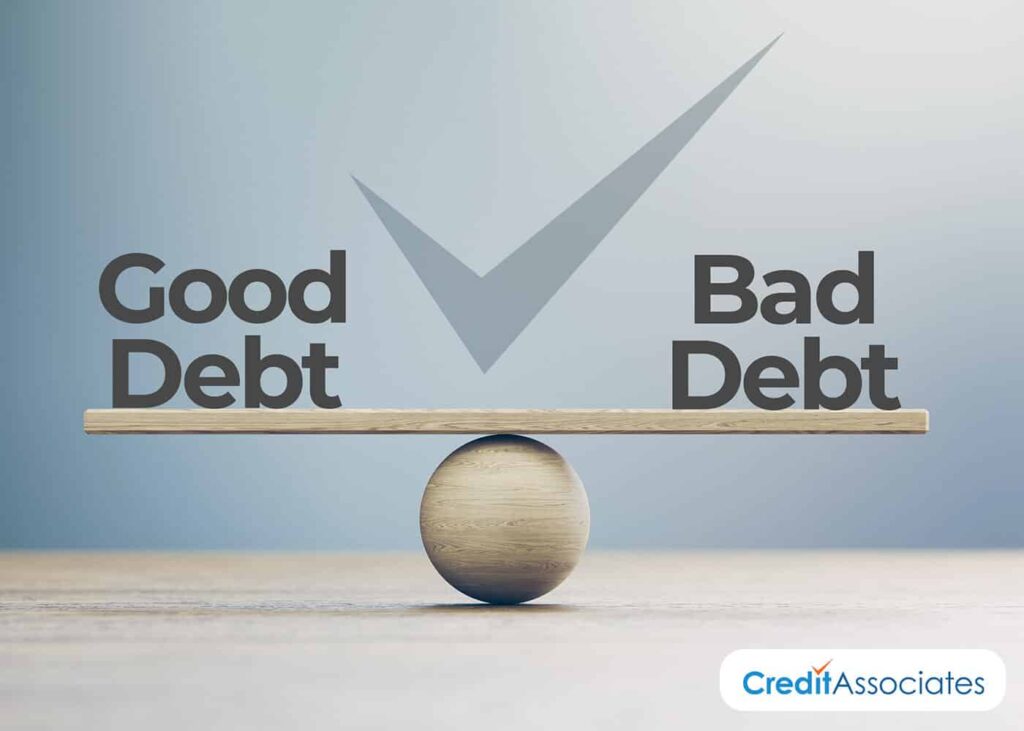Summary
- Not all debt is bad; “good” debt, like regular loan payments, can boost credit scores and aid in securing future loans.
- Good debt is manageable and reflects positively on lenders, showing you as a responsible borrower.
- Bad debt causes financial strain, indicated by missed payments, high interest rates, or excessive debt accumulation.
- Debt settlement, a form of debt relief, allows for paying off debt for less than owed, potentially speeding up the path to being debt-free.
- If managing debt is a concern, CreditAssociates® can help reduce what you owe by up to half.
The United States has long been drowning in debt, and the issue doesn’t seem to be improving. About 340 million Americans are walking around with some kind of debt—and credit card debt remains one of the largest sources. So, given that debt is just “a fact of life” for many of us, is all debt by definition bad? Or, if “bad” debt exists, does that mean there’s such a thing as “good” debt? In fact, it’s most certainly possible to accrue “good” debt. And knowing the difference between good and bad debt is a great step toward future financial security. Read on, and learn the distinction between good debt and bad debt.
First, let’s explore the concept of debt.
Simply put, debt is borrowed money. In most cases, the money is borrowed to help front the expense for a large purchase, when funds are not readily available. Almost always, the money must be paid back with interest. Meaning, you have to pay back the amount you borrowed plus an additional percentage of the total loan. This is how banks and other lenders make profits and stay in business.
A few common types of debt, or borrowed money, are:
- Credit card debt
- Student loan debt
- Mortgage loan debt
- Auto loan debt
- Medical debt
Is debt good or bad?
The answer might surprise you, but not all debt is inherently “bad.” In fact, making regular payments on loans, including personal credit cards can be a great way to help boost your credit score. And a good credit score can make it a lot easier to buy a house or car. Keeping up with your loan payments can also help you establish “credit history”—another factor that can positively impact your ability to qualify for future loans and large purchases. When you hear someone refer to “good” debt, this is what they mean: the kind of monthly, manageable debt that shows potential lenders that you are a responsible, low-risk candidate for a loan.
Okay, what is “bad” debt then?
While some debt can be good, debt can also sometimes become “bad.” Bad debt could be debt that has become unhealthy and is causing financial strain. If you’re regularly missing payments and paying high interest rates or fees, or if you’re worried you’re accumulating too much debt, it might be a sign that your debt is becoming unhealthy.
If you feel like any of these factors describes you, debt relief could be a good option to help get you back on track—and get your credit score back into a healthy range.
Here are a few red flags that could mean you’re dealing with bad debt:
- You feel stretched, trying to make your monthly payments
- You’re late on payments or have skipped payments
- You’re getting calls from collectors
- Your debt is leaving you feeling overwhelmed
Here are a few related articles to help you learn more about debt relief:
- Is Debt Relief Right for Me?
- Three Ways Debt Relief Can Secure Your Financial Future
- Four Top Ways Professional Debt Relief Saves You Money
So how do you fix bad debt?
If any of the red flags we listed above apply to you, you might be experiencing an unhealthy amount of debt. But don’t worry! There’s help available. As we mentioned earlier, debt relief could be a good option.
For example, one specific type of debt relief called “debt settlement” could be a great option to help you resolve your debt by paying a lower amount than you owe. With this option, debt settlement companies will negotiate with your creditors to help you settle your account for a fraction of the outstanding balance. On top of saving you money, this path could also help you become debt free faster!
You can read more about debt settlement in these articles:
Still worried about where to turn? CreditAssociates can help you!
CreditAssociates has helped thousands of people just like you become debt-free for less than they owe, by offering personalized debt settlement programs. Our certified debt consultants can walk you through our process and provide a free, no commitment debt evaluation. It’s a great, no risk way to see if we’re a good fit for you. During your consultation, we’ll provide a customized plan that could help resolve your debt in as little as 24 months, giving you the financial freedom you deserve. To sign up for a free consultation, just fill out our online form or give us a call today at 1-800-983-6693.
